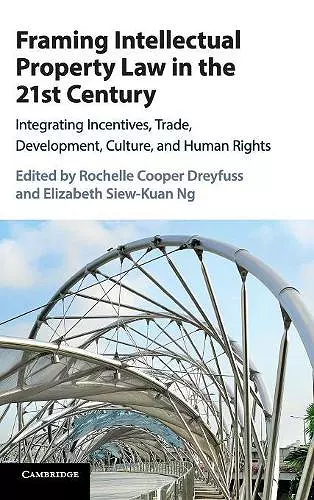Framing Intellectual Property Law in the 21st Century
Integrating Incentives, Trade, Development, Culture, and Human Rights
Elizabeth Siew-Kuan Ng editor Rochelle Cooper Dreyfuss editor
Format:Hardback
Publisher:Cambridge University Press
Published:18th Oct '18
Currently unavailable, and unfortunately no date known when it will be back
This hardback is available in another edition too:
- Paperback£36.99(9781316501160)

The book describes how intellectual property law is framed by theories about incentives, trade, health, development, and human rights.
The book provides a background on intellectual property (IP) protection (copyright, patent and trademark law), and examines how that law has been shaped when the justification for the law and its limits are seen from an economic perspective (IP as an incentive to invent), versus human rights, development, trade and health perspectives.As knowledge production has become a more salient part of the economy, intellectual property laws have expanded. From a backwater of specialists in patent, copyright, and trademark law, intellectual property has become linked to trade through successive international agreements, and appreciated as key to both economic and cultural development. Furthermore, law has begun to engage the interest of economists, political theorists, and human rights advocates. However, because each discipline sees intellectual property in its own way, legal scholarship and practice have diverged, and the debate over intellectual property law has become fragmented. This book is aimed at bringing this diverse scholarship and practice together. It examines intellectual property through successive lenses (incentive theory, trade, development, culture, and human rights) and ends with a discussion of whether and how these fragmented views can be reconciled and integrated.
'This book critically examines traditional principles of intellectual property (IP) such as the incentive theory for justifying exclusivity and IP protection's linkage with trade and investment from new perspectives for the twenty-first century. Professor Dreyfuss and Professor Ng brought together global academic leaders to tackle on challenging topics: Whether IP is necessary? How human rights, culture and other significant values are incorporated in the current international IP norms? Both students and professionals will benefit from innovative analysis presented in each chapter.' Toshiko Takenaka, W. Hunter Simpson Professor of Technology Law, University of Washington
'A fresh and engaging re-assessment of first principles that underlie arguments for different levels of intellectual property (IP) protection. The book offers an array of disciplinary, doctrinal, and geographic perspectives, with a special focus on Singapore. Blending the global and the local, and high- and low-protectionist perspectives, the contributors thoughtfully reflect on the value of different frames for enriching and extending contemporary debates over IP rights.' Laurence R. Helfer, Harry R. Chadwick, Sr Professor of Law, Duke University, North Carolina
'In this book, a first-rate group of experts provide a sophisticated and candid analysis of the advantages and limitations of various justifications for intellectual property protection, including incentive-based theory, facilitating trade among nations, and protecting public health, culture, and human rights. The book also contains a valuable discussion of empirical studies and doctrinal and institutional reforms. It is essential reading for anyone interested in improving intellectual property laws in our global marketplace.' Lisa P. Ramsey, University of San Diego School of Law
ISBN: 9781107135383
Dimensions: 235mm x 157mm x 25mm
Weight: 660g
368 pages